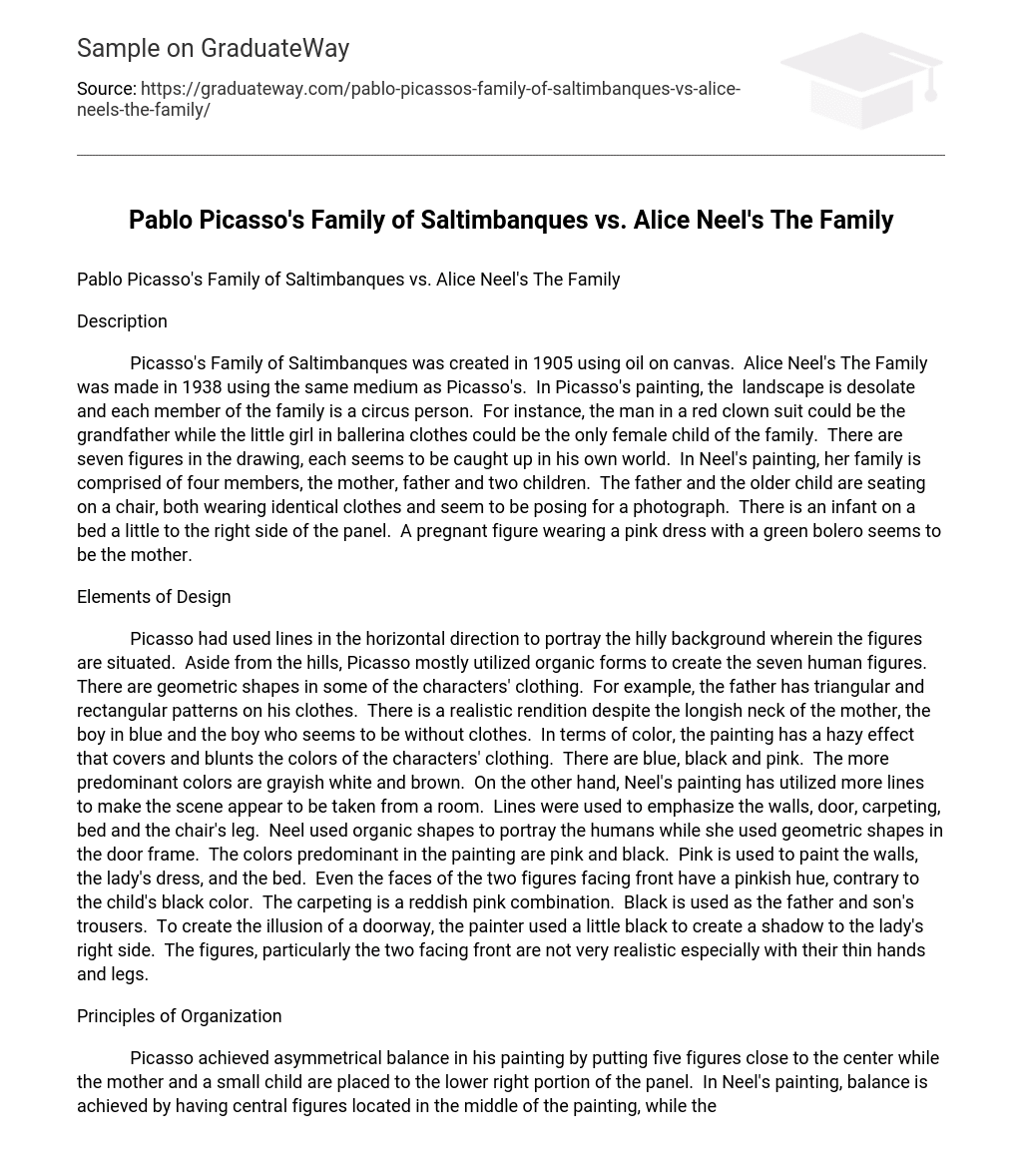Description
Picasso’s Family of Saltimbanques was created in 1905 using oil on canvas. Alice Neel’s The Family was made in 1938 using the same medium as Picasso’s. In Picasso’s painting, the landscape is desolate and each member of the family is a circus person. For instance, the man in a red clown suit could be the grandfather while the little girl in ballerina clothes could be the only female child of the family. There are seven figures in the drawing, each seems to be caught up in his own world. In Neel’s painting, her family is comprised of four members, the mother, father and two children. The father and the older child are seating on a chair, both wearing identical clothes and seem to be posing for a photograph. There is an infant on a bed a little to the right side of the panel. A pregnant figure wearing a pink dress with a green bolero seems to be the mother.
Elements of Design
Picasso had used lines in the horizontal direction to portray the hilly background wherein the figures are situated. Aside from the hills, Picasso mostly utilized organic forms to create the seven human figures. There are geometric shapes in some of the characters’ clothing. For example, the father has triangular and rectangular patterns on his clothes. There is a realistic rendition despite the longish neck of the mother, the boy in blue and the boy who seems to be without clothes. In terms of color, the painting has a hazy effect that covers and blunts the colors of the characters’ clothing. There are blue, black and pink. The more predominant colors are grayish white and brown. On the other hand, Neel’s painting has utilized more lines to make the scene appear to be taken from a room. Lines were used to emphasize the walls, door, carpeting, bed and the chair’s leg. Neel used organic shapes to portray the humans while she used geometric shapes in the door frame. The colors predominant in the painting are pink and black. Pink is used to paint the walls, the lady’s dress, and the bed. Even the faces of the two figures facing front have a pinkish hue, contrary to the child’s black color. The carpeting is a reddish pink combination. Black is used as the father and son’s trousers. To create the illusion of a doorway, the painter used a little black to create a shadow to the lady’s right side. The figures, particularly the two facing front are not very realistic especially with their thin hands and legs.
Principles of Organization
Picasso achieved asymmetrical balance in his painting by putting five figures close to the center while the mother and a small child are placed to the lower right portion of the panel. In Neel’s painting, balance is achieved by having central figures located in the middle of the painting, while the bed with the baby and the woman in the doorway put balance on the remaining portion of the panel.
In Neel’s painting, the two figures facing front take up most of the space, making them the central characters. Essentially the two figures are emphasized in this piece. In Picasso’s work, the landscape takes equal space compared to the figures, giving it a bigger importance in what the painting could mean. The emphasis in this work are equally placed on the figures and the desolate landscape.
The Saltimbanques reflects a group of persons who seem to be contemplating where to go next, giving the painting a sense of suspended movement. In The Family, the mother is the only figure who seems to be moving because of how her body is positioned.
Both paintings appear united by being consistent in the use of colors. Grayish white harmonizes Picasso’s Saltimbanques, while pink unifies Neel’s Family.
Purpose
The death of Neel’s young daughter due to sickness had impacted her works, which often involved themes of motherhood, anxiety and loss. In The Family, the older man could have been Carlos, her husband, while the smaller version could have been their child. The baby on the bed could have been another one of their own, while the pregnant lady in the background could have been Neel.
Picasso’s theme in his work between 1904 and 1906 involved circus people, whom he felt an affinity because of how they resemble the artists of the time — independent but poor. The National Gallery of Art suggests that this painting is Picasso’s representation of how he viewed himself and his circle during this time. Each figure in the painting is part of a group but essentially different from one another.
References
Alice Neel Gallery: 1930s. The Family. Retrieved September 14, 2008, from
http://www.aliceneel.com/g30.html
The Collection: National Gallery of Art. (2008). Family of Saltimbanques. Retrieved September
14, 2008, from http://www.nga.gov/collection/gallery/20centpa/20centpa-46382.0.html





